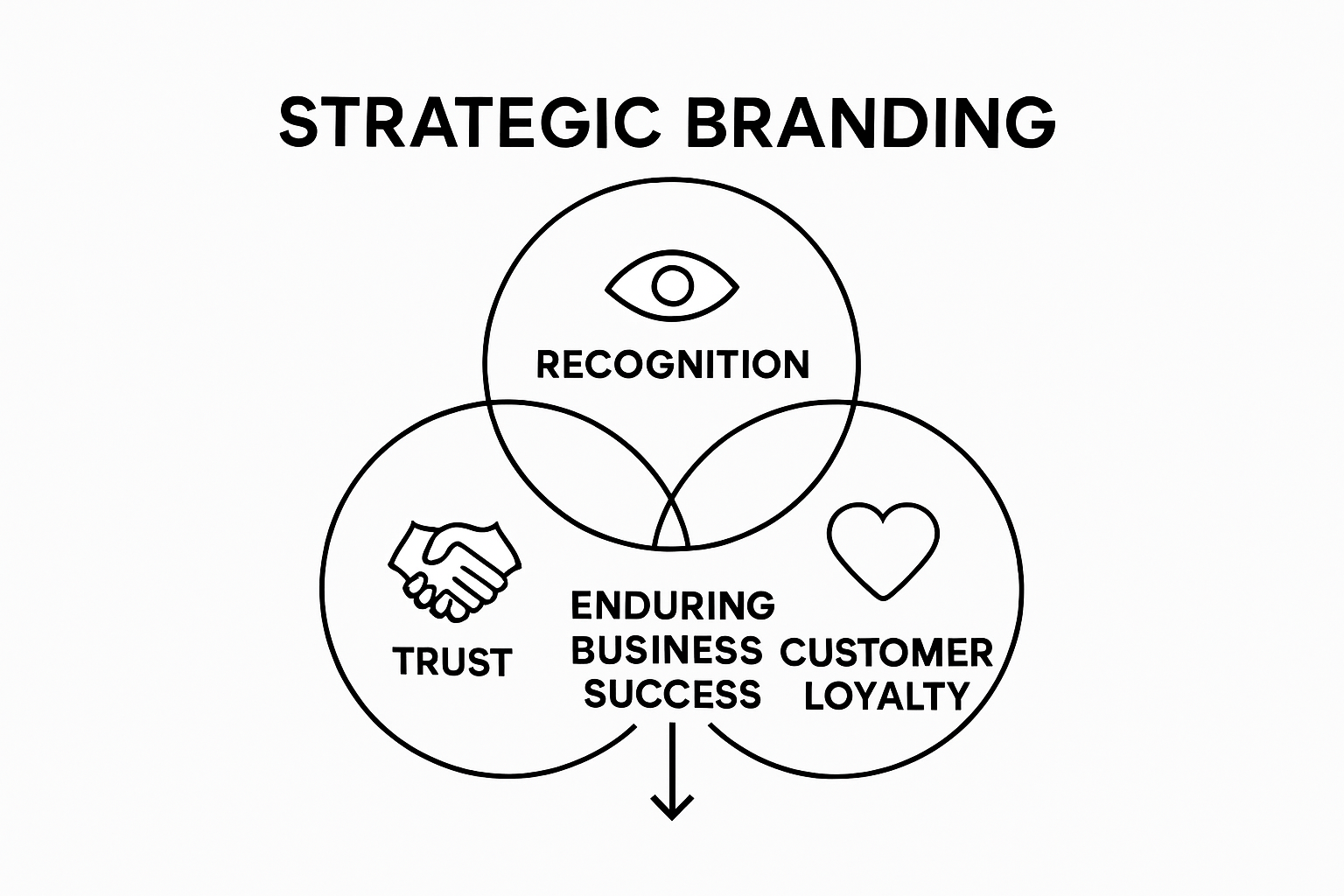What Is Rebranding and Why It Matters

Explore the advantages of strategic branding and how it elevates your business identity, fosters loyalty, and drives growth.

Most people think branding is all about a cool logo or catchy slogan. But research shows that companies with strong brand strategies enjoy more consistent growth and customer loyalty according to Harvard Business Review. It turns out visual design is just the surface and the real power comes from a deeper, strategic approach that can turn any business into a trusted authority.
Strategic branding represents a comprehensive approach to building and positioning a brand that goes far beyond simple visual design or logo creation. At its core, strategic branding is a deliberate process of defining how a business wants to be perceived by its target audience, creating a cohesive narrative that connects emotional and rational touchpoints.
Strategic branding encompasses several critical elements that transform a basic business identity into a powerful market presence. Forbes research highlights that successful strategic branding integrates multiple dimensions:
What sets strategic branding apart from traditional marketing approaches is its holistic perspective. Instead of treating brand elements as separate tactics, it views the entire brand experience as an interconnected ecosystem designed to build trust, recognition, and long-term customer relationships.
Below is an overview table summarizing the key components of strategic branding and their descriptions, helping clarify how each element works together to build a successful brand presence.
ComponentDescriptionIdentity DevelopmentUnique visual and verbal representation that distinguishes the businessPositioningClear market differentiation from competitorsEmotional ConnectionCrafting narratives that resonate with the target audience’s values and aspirationsConsistencyMaintaining a cohesive experience across all brand touchpointsValue PropositionCommunicating what makes the business uniquely valuable to customersCustomer ExperienceDesigning interactions that reinforce brand promises and foster loyalty
Businesses that invest in strategic branding gain significant competitive advantages. According to Harvard Business Review, companies with well-defined brand strategies experience more consistent growth and customer loyalty. Strategic branding helps businesses:
For entrepreneurs and small business owners, strategic branding isn’t a luxury—it’s a critical foundation for sustainable growth. By thoughtfully designing how customers perceive and interact with their brand, businesses can transform from generic service providers to memorable, trusted partners in their customers’ journeys.

Ultimately, strategic branding is about intentionality. It’s a deliberate approach to presenting your business that combines visual design, messaging, customer experience, and core values into a unified narrative that attracts, engages, and retains your ideal customers.
Brand identity serves as the foundational blueprint that communicates a business’s essence, values, and unique positioning in the marketplace. More than just a visual aesthetic, it represents the comprehensive personality and promise a company makes to its customers, stakeholders, and broader market ecosystem.
Nielsen Research reveals that successful brand identities are composed of interconnected elements that work synergistically to create a memorable and compelling business persona. These core components include:
The most powerful brand identities transcend mere visual representation. They create an emotional resonance that transforms businesses from commodity providers into trusted partners. When customers encounter a well-crafted brand identity, they instantly recognize and connect with the underlying values and narrative.
Harvard Business Review demonstrates that organizations with distinctive brand identities experience significant competitive advantages. A robust brand identity acts as a strategic differentiator, enabling businesses to:
For entrepreneurs and small business owners, investing in a thoughtful brand identity is not an optional marketing exercise—it’s a critical business strategy. A well-designed brand identity communicates professionalism, builds credibility, and signals to potential customers that your business understands their needs and can deliver exceptional value.
The following table compares the main strategic benefits that businesses achieve with strong brand identity, clarifying why investing in brand identity is critical for long-term business success.
Strategic BenefitExplanationCommand Premium PricingEnables higher prices due to perceived valueAttract Top TalentAppeals to high-quality employees and partnersIncrease Customer LoyaltyEncourages repeat business through strong emotional bondsBuild CredibilitySignals professionalism and trustworthy performanceFoster Emotional ConnectionCreates lasting relationships beyond purely transactional interactions
Ultimately, brand identity represents the strategic narrative that transforms a business from an anonymous market participant into a recognized, trusted, and memorable entity. It’s the invisible yet powerful force that turns potential customers into loyal advocates and differentiates exceptional businesses from forgettable ones.
Customer loyalty represents a complex psychological and emotional connection that goes far beyond simple repeat purchases. Strategic branding serves as the critical mechanism that transforms transactional relationships into genuine, long-lasting brand affinity and trust.
Forrester Research reveals that customers develop loyalty through a sophisticated interplay of emotional and rational experiences. Strategic branding creates multiple touchpoints that systematically build trust and connection:
Customers do not simply choose brands—they form relationships with them. Strategic branding provides the narrative framework that allows businesses to communicate their deeper purpose, transforming from mere service providers into meaningful partners in customers’ lives.
Harvard Business Review demonstrates that authentic brands create significantly stronger loyalty mechanisms. Authenticity emerges when businesses align their external communication with internal practices, creating a transparent and genuine brand experience. This approach helps businesses:
For entrepreneurs and small business owners, strategic branding becomes the bridge between customer perception and actual business performance. By thoughtfully designing brand interactions that feel genuine, personal, and consistently valuable, businesses can convert casual customers into passionate brand advocates.
Ultimately, customer loyalty is not purchased—it’s earned through intentional, strategic brand experiences that make customers feel understood, respected, and consistently delighted. Strategic branding provides the roadmap for creating these profound, lasting connections that transform businesses from commodity providers into trusted partners.

Consistent branding acts as a powerful mechanism for establishing professional credibility and building deep trust with potential customers. It transforms businesses from anonymous market participants into recognized, respected industry voices that command attention and inspire confidence.
McKinsey Research demonstrates that brands maintaining rigorous consistency across all communication channels experience significantly higher perception of authority. Consistency encompasses several critical dimensions:
Consistent branding eliminates confusion and signals professionalism. When every interaction reflects the same core identity, businesses create a predictable and trustworthy experience that reduces customer uncertainty and builds long-term confidence.
Harvard Business Review highlights that strategic brand consistency directly correlates with perceived expertise. By meticulously maintaining a unified brand presence, businesses can:
For entrepreneurs and small business owners, consistency becomes the bridge between perception and reality. By intentionally crafting a disciplined brand approach that remains true across all touchpoints, businesses transform from generic service providers into recognized industry experts.
Ultimately, building authority through consistent branding is about creating a reliable narrative that resonates with customers. It’s the strategic art of making every interaction an opportunity to reinforce your brand’s core promise, expertise, and unique value proposition.
Competitive differentiation represents the strategic imperative that transforms businesses from commodity providers into distinctive market leaders. Strategic branding serves as the critical mechanism through which companies develop unique market positioning that sets them apart from competitors and creates compelling value propositions.
ResearchGate reveals that successful market differentiation emerges from a sophisticated blend of strategic positioning and authentic brand storytelling. Companies seeking meaningful differentiation must focus on:
Beyond surface-level distinctions, true differentiation occurs when businesses understand and communicate their fundamental unique attributes. This requires deep introspection about core competencies, target audience needs, and the distinctive solutions a brand provides.
Harvard Business Review demonstrates that effective differentiation involves more than simply being different—it requires being meaningfully different. Successful brands create differentiation through:
For entrepreneurs and small business owners, competitive differentiation represents a critical survival strategy. By thoughtfully constructing a brand that stands out through genuine value and unique perspective, businesses can transcend price-based competition and create meaningful market positioning.
Ultimately, strategic branding transforms competitive differentiation from an abstract concept into a tangible business advantage. It allows companies to move beyond generic market offerings and establish themselves as unique, indispensable solutions for their target audience.
Are you tired of seeing your brand blend in, even after investing in eye-catching design or clever marketing tactics? The article explained how true strategic branding is about more than a logo. It is about building a cohesive identity, connecting with your audience’s emotions, and standing out within a crowded market. You want that next level of loyalty and recognition—the kind that drives consistent growth and positions you as the authority your customers trust. But navigating all the moving parts alone often drains resources and leaves you stuck in place.

This is where Reasonate Studio can help turn your brand strategy into a living, breathing system built for impact. Our Aligned Impact Model™ uncovers your unique value, clarifies your narrative, and streamlines your marketing so every move is intentional. Explore how we help entrepreneurs and small businesses like yours become recognized leaders. Visit Reasonate Studio now to discover how working with a strategic partner can transform your brand’s identity, increase customer loyalty, and secure your spot at the top of your industry. Take control of your brand’s future today—clarity and growth are just a click away.
Strategic branding is a comprehensive approach to building and positioning a brand that defines how a business wants to be perceived by its target audience, integrating visual design, messaging, and customer experience into a cohesive narrative.
Strategic branding helps businesses communicate their unique value proposition, build emotional connections, create a memorable market presence, and foster customer loyalty, leading to sustainable growth.
Brand identity, which includes visual, verbal, and experiential elements, communicates a business’s essence and values. A strong brand identity resonates emotionally with customers, making a company more recognizable and trustworthy.
Consistency in branding creates a reliable narrative across all communication channels. It builds trust and authority, enabling businesses to establish themselves as industry experts and reduce customer uncertainty.